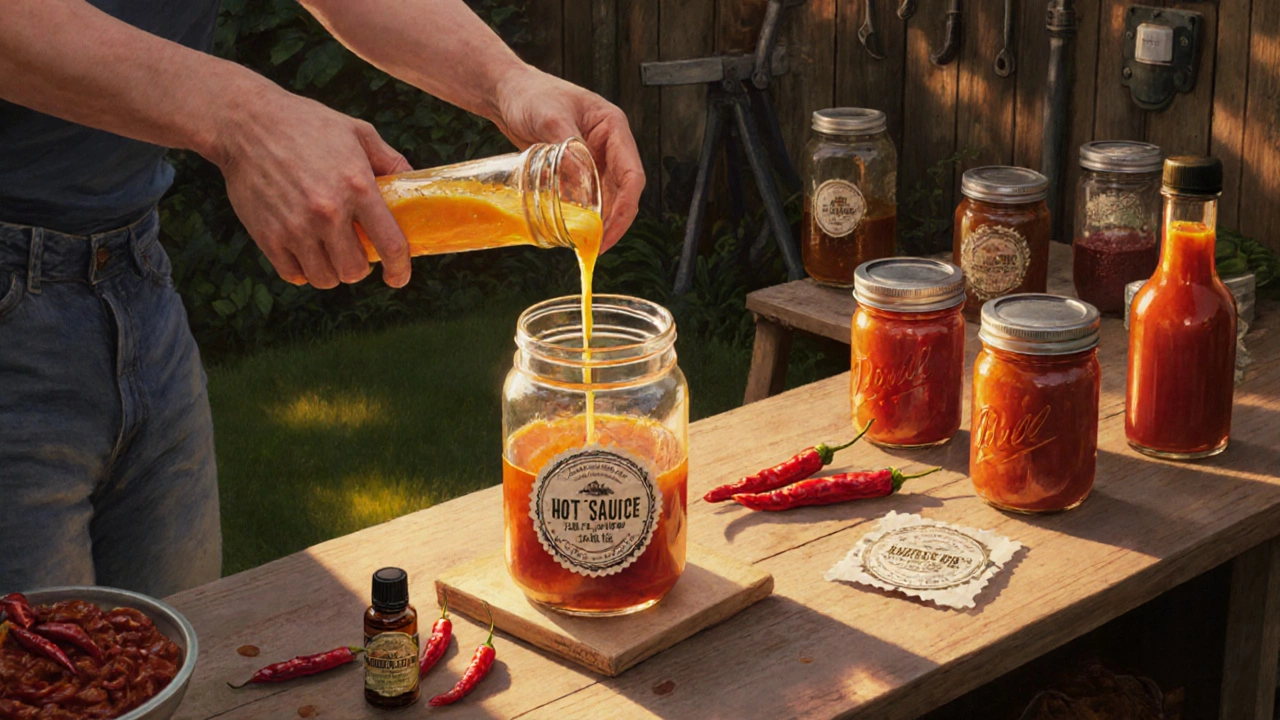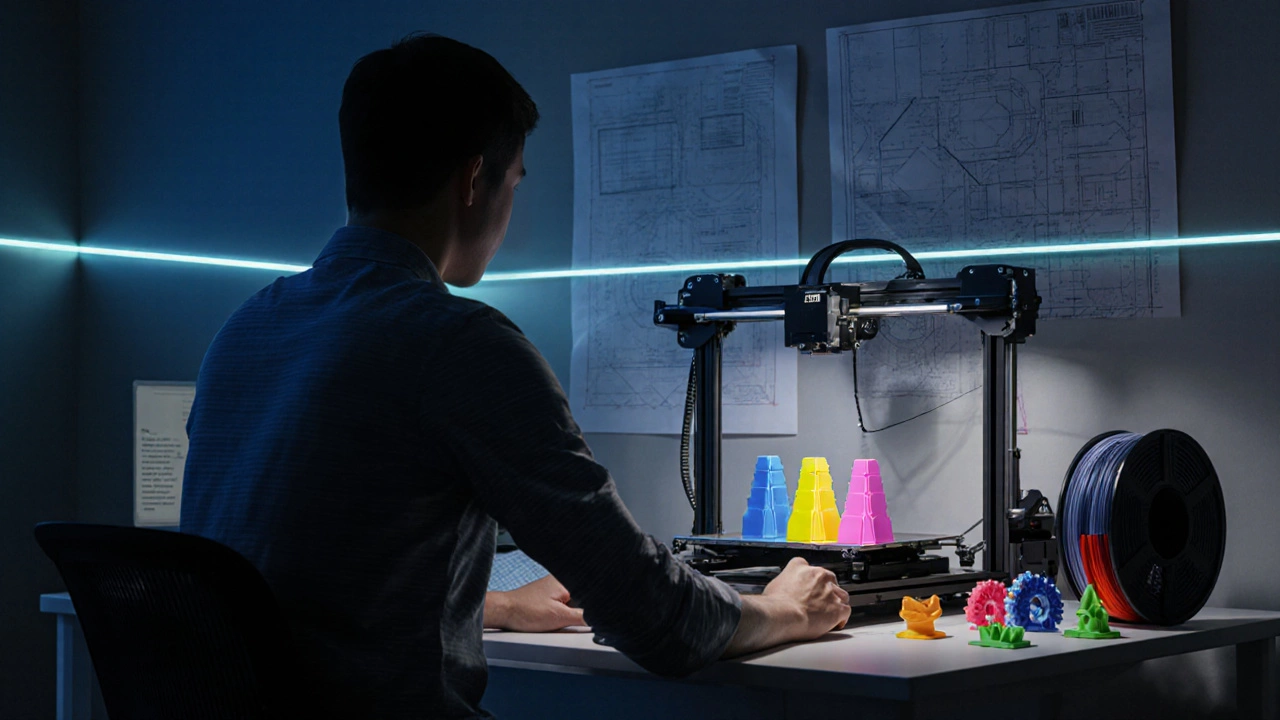Manufacturer Qualification Tool
Check Your Manufacturing Qualification
Answer these 5 questions to determine if your business qualifies as a manufacturer according to Australian guidelines.
If you run a small workshop, make products in your garage, or handcraft goods in your backyard, you might wonder: Do I count as a manufacturer? It’s not about how big your operation is. It’s about what you actually do. Many small business owners assume they’re not manufacturers because they don’t have a factory floor or 50 employees. That’s a myth. The real definition is simpler-and more inclusive-than most people think.
What Exactly Is a Manufacturer?
A manufacturer is anyone who transforms raw materials or components into a new product. That’s it. No fancy degrees, no permits required by law in most places to call yourself one. If you take fabric and sew it into bags, you’re a manufacturer. If you mix powders and press them into supplements, you’re a manufacturer. If you assemble circuit boards from parts bought online, you’re a manufacturer.
The key is transformation. You’re not just reselling. You’re not just packaging. You’re changing the form, function, or composition of something to create something new. A person who buys pre-made t-shirts and prints logos on them? Manufacturer. A person who buys wood and builds custom shelves? Manufacturer. A person who melts plastic pellets and molds them into phone cases? Manufacturer.
Small Scale Doesn’t Mean Not a Manufacturer
There’s a common misunderstanding that manufacturers need to be big. That’s not true. In Australia, over 80% of manufacturing businesses employ fewer than 20 people. Many operate out of sheds, garages, or small units. The Australian Bureau of Statistics defines a small manufacturer as one with fewer than 20 employees. That’s not an exception-it’s the norm.
Think about local artisans in Brisbane who make candles from soy wax and essential oils. Or the guy in Townsville who builds custom guitar pickups from copper wire and magnets. Or the woman in Adelaide who knits wool scarves from raw yarn. None of them have assembly lines. None of them have warehouses. But they all take inputs and turn them into finished goods. That’s manufacturing.
What Doesn’t Count as Manufacturing?
Not every business that makes things qualifies. Here’s what doesn’t:
- Resellers - Buying finished products and selling them as-is. No transformation.
- Packagers - Just putting products into boxes or labeling them. If you didn’t change the product itself, you’re a distributor.
- Service providers - Repairing, cleaning, or installing products. You’re fixing or using something, not creating it.
- Assemblers without design control - If you’re following someone else’s exact blueprint with no input on materials or design, you might be a contract assembler, not a true manufacturer.
For example, if you buy pre-cut wooden pieces from a supplier and screw them together into a bookshelf exactly as shown in the kit, you’re assembling. But if you design the shelf, choose the wood type, cut the pieces yourself, sand them, and finish them with your own oil blend? That’s manufacturing.

Legal and Tax Implications
Even if you’re small, calling yourself a manufacturer matters legally. In Australia, if you manufacture goods, you may need to register for GST if your turnover hits $75,000 per year. You may also need to comply with product safety standards under the Australian Consumer Law. If you’re making food, cosmetics, or children’s toys, specific regulations apply.
Some local councils require manufacturing businesses to have specific zoning permits-even if you’re working from home. In Brisbane, for example, running a small workshop from your garage might need a home-based business permit if it creates noise, traffic, or waste.
On the flip side, being recognized as a manufacturer opens doors. You can apply for small business grants, access manufacturing-specific tax offsets, and qualify for export support programs through Austrade. You’re not just a hobbyist-you’re part of Australia’s industrial base.
Real Examples of Small-Scale Manufacturers
Here are real cases from across Australia:
- Emma in Geelong - Buys organic cotton fabric, cuts patterns, sews baby wraps, and sells them online. She sources her dyes locally. She’s a manufacturer.
- James in Cairns - Collects recycled glass bottles, cleans them, fills them with hot sauce he blends from chilies, garlic, and vinegar, then labels and caps them. He doesn’t make the bottles-but he transforms the contents and packaging into a new product. He’s a manufacturer.
- Linh in Perth - Designs custom 3D-printed phone stands, orders filaments online, prints them in her home, and ships them. She didn’t make the printer, but she designed the product and produced it. She’s a manufacturer.
None of them have factories. None of them have sales teams. But they all meet the core definition: they create new products from materials or parts.

How to Prove You’re a Manufacturer
You don’t need a certificate. But if you ever need to prove it-say, for a grant application or bank loan-you should document:
- Your process - What raw materials do you start with?
- Your transformation - What steps do you take to change them?
- Your output - What’s the final product?
- Your design control - Did you decide how it’s made, or are you just following instructions?
Keep simple records: photos of your workspace, a list of materials used, a flowchart of your process, and invoices for raw inputs. That’s enough for most official purposes.
Why It Matters to Call Yourself a Manufacturer
Words have power. If you call yourself a “craftsperson” or “hobbyist,” people might underestimate your business. If you say you’re a manufacturer, you signal professionalism, scale, and intent.
It also changes how you think about your business. You start asking: How can I improve quality? Can I reduce waste? Can I scale this? Can I export? You stop thinking small. You start thinking like a producer.
In Australia, small manufacturers are the backbone of regional economies. They create jobs, keep skills alive, and innovate where big companies won’t. Recognizing yourself as one is the first step to growing beyond your garage.
Final Checklist: Are You a Manufacturer?
Answer these five questions:
- Do you start with raw materials or components (not finished goods)?
- Do you physically change them into something new?
- Do you design or influence how the final product is made?
- Do you sell the end product under your own name or brand?
- Is your output something that didn’t exist before you made it?
If you answered yes to all five-you’re a manufacturer. Size doesn’t matter. Location doesn’t matter. Equipment doesn’t matter. Transformation does.
Can I be a manufacturer if I work from home?
Yes. Many manufacturers in Australia operate from home garages, sheds, or spare rooms. What matters is the transformation of materials into new products-not the size of your space. Local councils may require a home-based business permit, especially if you generate noise, waste, or extra traffic, but you’re still legally a manufacturer.
Do I need a license to call myself a manufacturer?
No, there’s no official license to become a manufacturer in Australia. You don’t need to register with a government body just to use the term. But if you sell goods, you must follow consumer safety laws, register for GST if your turnover exceeds $75,000, and possibly get zoning approval for your workspace.
What’s the difference between a manufacturer and a reseller?
A reseller buys finished products and sells them without changing them. A manufacturer takes materials or parts and turns them into something new. For example, buying pre-made candles and selling them with your label is reselling. Making candles from wax, wicks, and fragrance oils you mix yourself is manufacturing.
Can a one-person business be a manufacturer?
Absolutely. Over 80% of Australian manufacturers employ fewer than 20 people, and many are solo operators. If you design, source materials, produce, and sell your own goods-even alone-you’re a manufacturer. The Australian Taxation Office and Austrade both recognize solo manufacturers for grants and support programs.
Do I need to register as a manufacturer to get government grants?
You don’t register as a manufacturer specifically, but you must prove you’re manufacturing to qualify for grants. This means showing you transform materials into new products. Programs like the Manufacturing Modernisation Fund or state-based small business grants require documentation of your production process, materials used, and final output. Keep records of your workflow and invoices.
